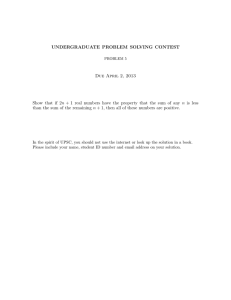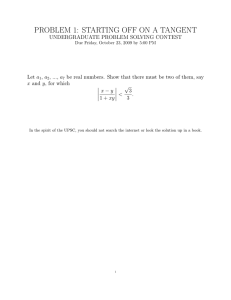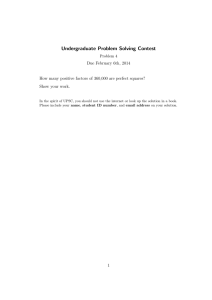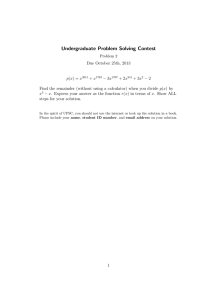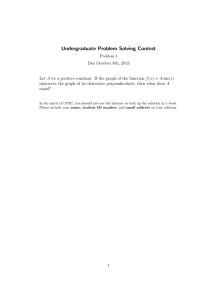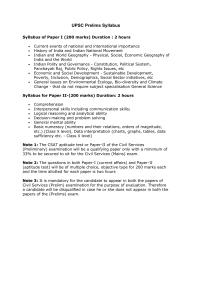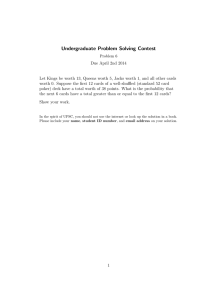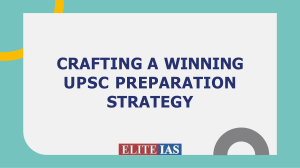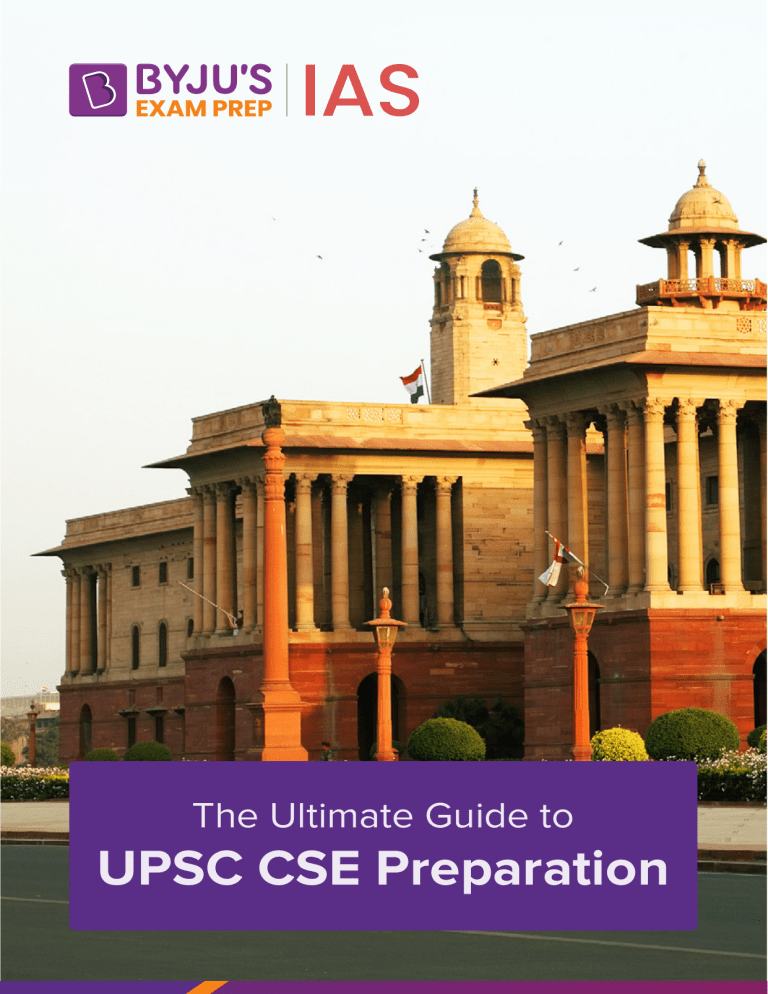
The Ultimate Guide to UPSC CSE Preparation INDEX Info about UPSC CSE 02 Subject-wise Weightage 07 Mains Examination (Subjective/Descriptive Type) 08 Mains Exam Syllabus 08 Personality Test (Interview) 17 Challenges faced by students 18 Preparation Strategy for IAS Aspirants 19 The Ultimate Guide to UPSC CSE Preparation 01 1. UPSC Exam Guide The Civil Services Exam is conducted by the Union Public Service Commission (UPSC) every year. It has three stages. Civil Services Examination Preliminary Examination Mains Examination GS 100 Questions 200 Marks The Ultimate Guide to UPSC CSE Preparation Personality Test CSAT 80 Questions 200 Marks 02 UPSC Exam Guide GS Current Affairs - Current events of national and international importance History - History of India and Indian National Movement Geography - Indian and World Geography - Physical, Social, Economic Geography of India and the World Indian Polity & Governance - Constitution, Political System, Panchayati Raj, Public Policy, Rights Issues, etc. Economic & Social Development - Sustainable Development, Poverty, Inclusion, Demographics, Social Sector Initiatives, etc. Environment - General Issues on Environmental Ecology, Biodiversity and Climate Change Science - General Science The Ultimate Guide to UPSC CSE Preparation 03 UPSC Exam Guide CSAT Logical Comprehension reasoning and Interpersonal analytical skills including ability communication skills Decision Basic Making and problem solving General numeracy mental ability The Ultimate Guide to UPSC CSE Preparation 04 UPSC Exam Guide Things to note for Prelims examination 1. Questions relating to English Language Comprehension skills of Class X level (last item in the syllabus of CSAT-II) will be tested through passages in English Language only, without providing Hindi translation thereof in the question paper. of the year he/she is appearing in the Preliminary Examination. Number of Attempts: Category Age Limit Attempt General 32 6 OBC 35 9 SC/ST 37 unlimited Disabled (HP) 42 9 42 As per candidates category (General) Disabled (HP) (Other category) 2. The questions will be of Multiple Choice and Objective Type. It is important to note that there is a negative marking for each wrong answer. A wrong answer will attract a penalty of 1/3rd of the marks allotted to that particular question 3. CSAT Paper II has been made qualifying from 2015. A candidate has to score a minimum of 33% of the marks to qualify in this paper. The marks scored in this paper will not be added to the marks scored in GS Paper I to arrive at the cut-off to clear Prelims 5. • An attempt at a Preliminary Examination shall be deemed to be an attempt at the examination • If a candidate actually appears in any one paper in the Preliminary Examination, he/she shall be deemed to have made an attempt at the examination • Notwithstanding the disqualification/ cancellation of candidature, the fact of appearance of the candidate at the examination will count as an attempt 4. A candidate must have attained the age of 21 years on 1st August, The Ultimate Guide to UPSC CSE Preparation 05 UPSC Exam Guide 6. Preliminary Examination of the Civil Services Examination shall be held for recruitment to the (xiii) Indian Railway Accounts Service, Group 'A' Services & Posts mentioned below: (xv) Post of Assistant Security Commissioner in Railway Protection Force, Group ‘A’ (i) Indian Administrative Service (ii) Indian Foreign Service (xiv) Indian Railway Personnel Service (iii) Indian Police Service (xvi) Indian Defence Estates Service, Group ‘A’ (iv) Indian P & T Accounts & Finance Service, Group ‘A’ (xvii) Indian Information Service (Junior Grade), Group ‘A’ (v) Indian Audit and Accounts Service, Group ‘A’ (vi) Indian Revenue Service (Customs and Central Excise), Group ‘A’ (vii) Indian Defence Accounts Service, Group ‘A’ (viii) Indian Revenue Service (IT), Group ‘A’ (ix) Indian Ordinance Factories Service, Group ‘A’ (Assistant Works Manager, Administration) (x) Indian Postal Service, Group ‘A’ (xi) Indian Civil Accounts Service, Group ‘A’ (xii) Indian Railway Trac Service, Group ‘A’ The Ultimate Guide to UPSC CSE Preparation (xviii) Indian Trade Service, Group 'A' (Gr. III) (xix) Indian Corporate Law Service, Group "A" (xx) Armed Forces Headquarters Civil Service, Group ‘B’ (Section Ocer’s Grade) (xxi) Delhi, Andaman & Nicobar Islands, Lakshadweep, Daman & Diu and Dadra & Nagar Haveli Civil Service, Group 'B' (xxii) Delhi, Andaman & Nicobar Islands, Lakshadweep, Daman & Diu and Dadra & Nagar Haveli Police Service, Group 'B' (xxiii) Pondicherry Civil Service, Group 'B' (xxiv) Pondicherry Police Service, Group 'B 06 2. Subject-wise Weightage Here is an analysis of the number of questions from each subject in the last nine UPSC Prelims (General Studies I) Exams: History Geography Polity Economy Science & Technology Environment 2011 13 11 11 12 19 19 15 2012 26 17 12 11 13 9 12 2013 28 11 9 13 15 11 13 2014 20 17 12 11 10 13 17 2015 29 14 14 13 13 7 10 2016 27 15 7 7 18 8 18 2017 34 14 7 22 8 4 11 2018 28 15 8 13 16 7 13 2019 22 17 14 15 14 7 11 *Analysis by BYJU’S IAS Current Affairs In the past few years, Current Affairs has had the highest weightage in the syllabus of Prelims Examination The Ultimate Guide to UPSC CSE Preparation 07 3. Mains Examination (Subjective/Descriptive Type) Mains Examination (Subjective/Descriptive Type) Papers to be counted for Merit Qualifying Papers Paper - A Paper - B (One of the Indian Languages to be selected by the candidate from the languages included in the Eighth Schedule to the Constitution). English 300 Marks (3 hrs) Paper - 1 Paper 2 to 5 Paper 6&7 Essay 250 Marks (3 hrs) GS (4 Papers) 1 Optional (2 Papers) 300 Marks (3hrs) General Studies – I 250 Marks (3 hrs) General Studies – II 250 Marks (3 hrs) General Studies – III 250 Marks (3 hrs) General Studies – IV 250 Marks (3 hrs) (Indian Heritage and Culture, History and Geography of the World and Society) (Governance, Constitution, Polity, Social Justice and International Relations) (Technology, Economic Development, Biodiversity, Environment, Security and Disaster Management) (Ethics, Integrity and Aptitude) Optional Paper-1 Optional Paper-2 250 Marks (3 hrs) 250 Marks (3 hrs) The Ultimate Guide to UPSC CSE Preparation 08 Mains Exam Syllabus GS Paper-I include events from the 18th century such as the industrial revolution, world wars, redrawal of national boundaries, colonization, decolonization, political philosophies like communism, capitalism, socialism, etc, their forms and effects on the society HISTORY Art & Culture Salient Aspects of Art Forms Literature and Architecture from ancient to modern times Ancient & Medieval History Modern History Mid 18th century to presentsignificant events, Personalities, and Issues GEOGRAPHY The Freedom Struggle- its various stages and important contributors/contributions from different parts of the country Salient Features of the World's Physical Geography Distribution of key natural resources across the world (including South Asia and the Indian sub-continent) Factors responsible for the location of primary, secondary, and tertiary sector industries in various parts of the world (including India) Post-independence consolidation and reorganization within the country World History The history of the world will The Ultimate Guide to UPSC CSE ExamPreparation Prep World & Indian Physical Geography 09 Mains Exam Syllabus Important Geophysical Phenomenon Earthquakes, Tsunami, Volcanic activity, Cyclone, etc. Geographical features and their location- changes in critical geographical flora and fauna and the effects of water-bodies and ice-caps) and in features (including such changes) Role of Women & Women Empowerment Population and Associated Issues Poverty & Developmental Issues Urbanization Effects of Globalization on Indian Society Social empowerment, communalism, regionalism & secularism GEOGRAPHY Salient Feature of Indian Society, Diversity of India GS Paper-II levels, and challenges therein INDIAN POLITY Indian Constitution- historical underpinnings, evolution, features, amendments, significant provisions, and basic structure Functions and responsibilities of the Union and the States, issues, and challenges pertaining to the federal structure, devolution of powers and finances up to local The Ultimate Guide to UPSC CSE Preparation Separation of powers between various organs, dispute redressal mechanisms, and institutions Comparison of the Indian constitutional scheme with that of other countries Parliament and State Legislatures structure, functioning, the conduct of business, powers & privileges and issues arising out of these 10 Mains Exam Syllabus Structure, organization, and functioning of the Executive and the Judiciary, Ministries, and Departments of the Government; pressure groups and formal/informal associations and their role in the Polity Salient features of the Representation of People's Act Appointment to various Constitutional posts, powers, functions, and responsibilities of various Constitutional Bodies Statutory, regulatory, and various quasi-judicial bodies Bilateral, regional and global groupings and agreements involving India and/or affecting India's interests. Effects of policies and politics of developed and developing countries on India's interests, Indian diaspora Important International institutions, agencies and their structure, mandate Social Justice Welfare schemes for vulnerable sections of the population by the Centre and States and the performance of these schemes; mechanisms, laws, institutions and bodies constituted for the protection and betterment of these vulnerable sections Issues relating to development and management of Social Sector/Services relating to Health, Education, Human Resources Governance Important aspects of governance, transparency and accountability, e-governance applications, models, successes, limitations, and potential; citizens charters, transparency & accountability and institutional and other measures Role of civil services in a democracy International Relations India and its neighborhood relations The Ultimate Guide to UPSC CSE Preparation 11 Mains Exam Syllabus GS Paper-III industries in India- scope and significance, location, upstream and downstream requirements, supply chain management ECONOMY Indian Economy and issues relating to planning, mobilization of resources, growth, development and employment Inclusive growth and issues arising from it Government Budgeting Major crops, cropping patterns in various parts of the country, different types of irrigation and irrigation systems storage, transport and marketing of agricultural produce and issues and related constraints; e-technology in the aid of farmers Issues related to direct and indirect farm subsidies and minimum support prices; Public Distribution System objectives, functioning, limitations, revamping; issues of buffer stocks and food security; Technology missions; economics of animal-rearing Food processing and related The Ultimate Guide to UPSC CSE Preparation Land reforms in India Effects of liberalization on the economy, changes in industrial policy and their effects on industrial growth Infrastructure: Energy, Ports, Roads, Airports, Railways etc. Investment models SCIENCE AND TECHNOLOGY Science and Technologydevelopments and their applications and effects in everyday life Achievements of Indians in science & technology; indigenization of technology and developing new technology Awareness in the fields of IT, space, computers, robotics, 12 Mains Exam Syllabus nano-technology, bio-technology and issues relating to intellectual property rights International Relations ENVIRONMENT & ECOLOGY Conservation Environmental pollution and degradation Environmental impact assessment Challenges to internal security through communication networks, role of media and social networking sites in internal security challenges Basics of cyber security; money-laundering and its prevention Security challenges and their management in border areas; linkages of organized crime with terrorism Various Security forces and agencies and their mandate INTERNAL SECURITY DISASTER Linkages between development MANAGEMENT and spread of extremism Role of external state and non-state actors in creating challenges to internal security Disasters and disaster management GS Paper-IV ETHICS, INTEGRITY AND APTITUDE Ethics and Human Interface: Essence, determinants, and The Ultimate Guide to UPSC CSE Preparation consequences of Ethics in human actions; dimensions of ethics; ethics in private and public relationships. Human Values – lessons from the lives 13 Mains Exam Syllabus and teachings of great leaders, reformers, and administrators; the role of family, society, and educational institutions in inculcating values Attitude: content, structure, function; its influence and relation with thought and behavior; moral and political attitudes; social influence and persuasion Aptitude and foundational values for Civil Service, integrity, impartiality and non-partisanship, objectivity, dedication to public service, empathy, tolerance, and compassion towards the weaker sections Emotional intelligence-concepts, and their utilities and application in administration and governance Contributions of moral thinkers and philosophers from India and the world Public/Civil service values and Ethics in Public administration: Status and problems; ethical concerns and dilemmas in government and private institutions; laws, rules, regulations and conscience as The Ultimate Guide to UPSC CSE Preparation sources of ethical guidance; accountability and ethical governance; strengthening of ethical and moral values in governance; ethical issues in international relations and funding; corporate governance Probity in Governance: Concept of public service; Philosophical basis of governance and probity; Information sharing and transparency in government, Right to Information, Codes of Ethics, Codes of Conduct, Citizen’s Charters, Work culture, Quality of service delivery, Utilization of public funds, challenges of corruption Case Studies on the above issues 14 Mains Exam Syllabus List of Optional Subjects Candidates may choose any optional subject from amongst the list of subjects given below Group 1 1. Agriculture 14. Management 2. Animal Husbandry and Veterinary Science 15. Mathematics 3. Anthropology 16. Mechanical Engineering 4. Botany 17. Medical Science 5. Chemistry 18. Philosophy 6. Civil Engineering 19. Physics 7. Commerce and Accountancy 20. Political Science and International Relations 8. Economics 21. Psychology 9. Electrical Engineering 22. Public Administration 10. Geography 23. Sociology 11. Geology 24. Statistics 12. History 25. Zoology 13. Law The Ultimate Guide to UPSC CSE Preparation 15 Mains Exam Syllabus Group 2 1. Assamese 13. Marathi 2. Bengali 14. Nepali 3. Bodo 15. Oriya 4. Dogri 16. Punjabi 5. Gujarati 17. Sanskrit 6. Hindi 18. Santhali 7. Kannada 19. Sindhi 8 Kashmiri 20. Tamil 9. Konkani 21. Telugu 10. Maithili 22. Urdu 11. Malayalam 23. English 12. Manipuri The Ultimate Guide to UPSC CSE Preparation 16 Personality Test (Interview) 1. The candidate who has cleared the Mains examination will be interviewed by a board who will have before them a record of his/her career. He/she will be asked questions on matters of general interest. 5. The technique of the interview is not that of a strict cross-examination but of a natural, well-directed, and purposive conversation which is intended to reveal the mental qualities of the candidate. 2. The objective of the interview is to assess the personal suitability of the candidate for a career in public services by a board of competent and unbiased observers. 6. The interview test is not intended to be a test either of the specialized or general knowledge of the candidates which has already been tested through their written papers. 3. The test is intended to judge the mental caliber of a candidate. In broad terms, this is really an assessment of not only his/her intellectual qualities but also social traits and his/her interest in current affairs. 7. 4. Some of the qualities to be judged are mental alertness, critical powers of assimilation, clear and logical exposition, the balance of judgment, variety, and depth of interest, the ability for social cohesion and leadership, and intellectual and moral integrity. The Ultimate Guide to UPSC CSE Preparation Candidates are expected to have taken an intelligent interest not only in their special subjects of academic study but also in the events which are happening around them both within and outside their own state or country as well as in modern currents of thought and in new discoveries which should arouse the curiosity of well-educated youth Note: The interview carries 275 marks Grand Total: 2025 17 Challenges faced by students comprehensively covered the subject matter 1. Vast syllabus The syllabus for UPSC CSE is vast You never know where to start from You may end up spending too much time on a not-so-important topic or too little time on a high-scoring topic It’s a possibility that by the time you have finished the fifth chapter of a subject, you may not recall the important points of the first chapter 3. Tough to stay motivated It’s tough to stay motivated throughout this arduous preparation journey. Poor scores in mocks/sectional tests, despite your hard work, can easily bring you down Facing difficulty in writing answers in 150-250 words when you have too little or way more content, can be really frustrating Not being able to understand why you are fetching low marks for your answers can be really demotivating 2. Too many resources IIt’s very easy to get confused with the plethora of resources available online or offline You never know which books are the right ones Every author can have a different viewpoint, but it’s difficult to choose the books which have The Ultimate Guide to UPSC CSE Preparation You will seldom have to time to read 3-4 books on the same subject just to cover every view point Preparation Strategy for IAS Aspirants Candidates should familiarise themselves with important tips to utilize their time efficiently and study resources that can be used. We are sharing some important points to be kept in mind which, if you follow, will certainly help you in acing the UPSC CSE exam. time & date to complete reading, taking notes, and analyzing the same Reading daily newspaper articles to stay updated on current affairs is a must for any IAS Aspirant Create a timetable in a calendar app for vital dates and tasks. If you have difficulty following your time-table, you can share the same with your friends and family and they can help you keep track of the same with an objective mindset. 1. Prepare a Time Table The most important factor to achieve success in this competitive exam is time management. The first step toward time control is to put together a timetable for the examination accordingly. Prepare a study plan that is straightforward and clean to follow. Do not complicate the agenda with undesirable tasks. Include quick breaks for food, rest, and snacks within the timetable. Allocate time for every subject matter with a cut-off The Ultimate Guide to UPSC CSE Preparation 2. Prioritize Your Subjects Most of the students begin preparing for the examination by selecting random topics. They do not have a timetable or schedule to be followed. And in the long run, they 19 Preparation Strategy for IAS Aspirants become confused about what they have completed and what is yet to be studied. Prioritize topics and set timelines in the schedule. Start with small yet achievable goals. You need to give proper time to both Prelims and Mains answer writing practice. Most of the students are habituated to constantly studying till the final stage of exams. This will only lead to fatigue and unnecessary stress right before the examinations. Preparation for CSE is a marathon, not a sprint. You can’t cover up if you miss your daily current affairs updates for 10-15 days. Be consistent with your preparation schedule and it will start showing results. Prepare a stress-free plan on a day-to-day basis and make sure to include quick breaks. Make a list of the topics that you are weak at and prepare them accordingly 3. Keep Extra Time For Revision Extra time for revision can help students with their preparation. 4. Be consistent in your preparation Include time for revising the syllabus. Do check for the topics that might have skimmed through or missed completely. Revision can help in remembering information during the exam. Take weekly/monthly sectional tests online for better preparation to ensure all the topics are covered. The Ultimate Guide to UPSC CSE Preparation 5. Understand the needs of the Exam Before beginning your preparation, try to understand how UPSC tests the aspirants in this exam UPSC is not just about factual knowledge. It is also about 20 Preparation Strategy for IAS Aspirants your ability to present your opinions properly and support them with facts and data during the mains exam and at the interview stage. Make sure the time is utilized wisely for the preparation of the exams. As there can be a delay in studying thinking that there is a lot of time and will do it later. But it is not advisable to waste time as it can create a burden with more topics to study at the last moment. Do not waste time and work hard for better results. Eliminate distractions during the preparation time. It’s critical that throughout your preparation, you should keep this end goal in mind. 6. Do Not Waste Time Effective time management is the most important factor in cracking competitive exams. First and foremost, value and respect time. The Ultimate Guide to UPSC CSE Preparation 21 About BYJU’S Exam Prep India’s Largest EdTech Company Coaching IAS aspirants for 10+ years 3 Crore+ Registered Aspirants 1000+ Of Our Students are IAS Rankers Download The App Today! +91-9650052904 support@byjusexamprep.com www.byjusexamprep.com The Most Comprehensive Exam Preparation App
